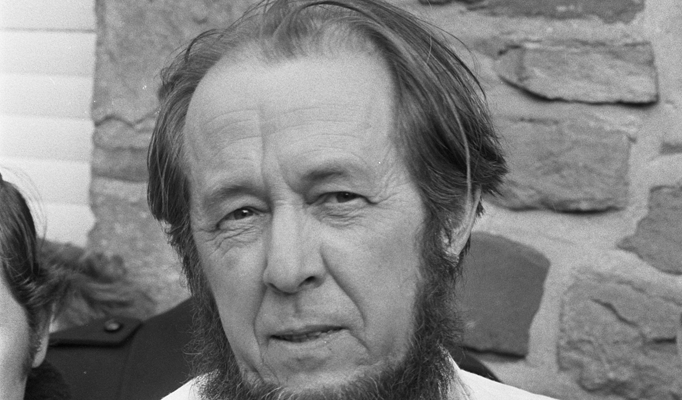
Have you noticed in our ‘woke’ western world that communism is once again becoming thinkable and even trendy for some? Alexander Solzhenitsyn commented: “For us in Russia, communism is a dead dog, while for many people in the West, it is still a living lion.”
It is time to read Solzhenitsyn’s epic book Gulag Archipelago. Solzhenitsyn spent nine years interviewing two hundred and fifty-six former Gulag prisoners. We have been so sheltered and pampered in the West that most of us have no idea how deeply millions of Russians suffered in the Gulag political prisons. Few realize as well that the horrific Gulag became a crucible of spiritual renewal for those who looked to Jesus as their only hope. Revival historically is often connected with great suffering and persecution. That is why Jesus said: “Blessed are you when people insult you, persecute you and falsely say all kinds of evil against you because of me. Rejoice and be glad, because great is your reward in heaven, for in the same way they persecuted the prophets who were before you.” (Matthew 5:11-12)
Initially, Solzhenitsyn felt hopeless by the length of his Gulag sentence in Siberia. Gradually, he became self-reflective, and realized his own responsibility for participating in the lies and violence that sustained Stalinism: “Lies have nothing to maintain them save violence.” This is why Solzhenitsyn became passionate about telling the truth, whatever the cost. Lies steal our souls. Silence kills.
While in school, Solzhenitsyn had his crucifix ripped off his neck by older youth. At age 12, he joined the communist Young Pioneers and later the teenage Komsomol. Then at age 17, with its rousing Marxist flag-waving, chanting, drum-beating, and trumpet-blowing, the soviet school system converted him to become a militant Stalin-quoting atheist: “I was absolutely enthralled by it…The Party had become our father and we, the children, obeyed it,” He said. In 1945, when he was thrown into the brutal Gulag prison system, it showed him the emptiness and hypocrisy of Marxist ideology.
Solzhenitsyn’s training in mathematics and physics resulted in his being transferred to a scientific research institute in 1947 to 1950. This miraculously helped him survive the harshness of the Gulag life. At one point, however, the oppression, abuse by the guards, and the backbreaking work as a bricklayer left him in despair. Determined to somehow end his life, he watched a gaunt, older prisoner squat beside him. Without saying anything, he drew the sign of the cross in the dirt next to Solzhenitsyn’s feet. This simple act gave Solzhenitsyn hope.
While being treated for cancer in the Gulag, a believing Jewish doctor, Boris Nikolayevich Kornfeld, shared the gospel with him. The next day, the doctor was attacked and his head was crushed in. This trauma opened Solzhenitsyn up to Jesus. As a restored believer, he began secretly writing at 4 am in the morning. Dr Jordan Peterson commented that Solzhenitsyn publishing the Gulag Archipelago completely demolished the moral credibility of communism, resulting in the collapse of the Soviet Union. Russia was so upset by the publishing of this book in France that they accused Solzhenitsyn of slander, treason, and moral degradation.
He had discovered that good and evil lie in everyone’s heart. “It takes spiritual courage therefore to face a far more dangerous foe, a truly deadly enemy: our own worst selves.” The unthinkable scale of Stalinist evil however required the cover of ideology to rename evil as good: “Ideology is what gives evil-doing its long-sought justification, and gives the evildoer the necessary steadfastness and determination.”
Solzhenitsyn came to identify his Gulag sufferings with the passion of Jesus on the cross. Because it was his prison experience that brought him back to Christ, he said: “I say without hesitation, bless you, prison, for having been in my life!” Leo Tolstoy was right…He actually needed prison as a drought needed a shower of rain! He called it his education that will last forever.
In 1970, Solzhenitsyn was awarded the Nobel Prize in Literature “for the ethical force with which he has pursued the indispensable traditions of Russian literature.” But it was impossible for him to go to Sweden to receive the Nobel Prize, because of the expectation that he would not be allowed back in Russia. It was only four years later after being expelled from the Soviet Union that he received the award.
Solzhenitsyn challenged Russia to not only abandon communism, but to actively repent of the harm that they had done in the Gulag: “It is Russia’s unwillingness to declare communism a crime and express repentance for it that dooms it to support for a return to it today and new upheavals tomorrow,” he wrote.
“Without the gift of repentance,” said Solzhenitsyn, “Russia will perish and drag down the whole world with it.” Perhaps the horrific trauma currently inflicted by Russia on Ukraine is because Russia never really repented of their earlier misdoings. “Silence about evil,” said Solzhenitsyn, “implants it so deeply within us that it will rise up a thousand-fold in the future.”
During Stalin’s Great Purge of 1937, over 700,000 neighbours and co-workers were shot or sent to Siberia, many of them loyal Stalinists. Everyone was given a quota system on the number of people that they had to betray, or else they would suffer the painful consequences themselves.
Such evil, which Solzhenitsyn showed went back to Lenin, did not stay contained, but rather metastasized. As 1 Timothy 3:11 put it, “evil men and impostors will go from bad to worse, deceiving and being deceived.”
We thank God for brave people like Solzhenitsyn who had the courage to tell the God-given truth which sets people free.

Leave a Reply